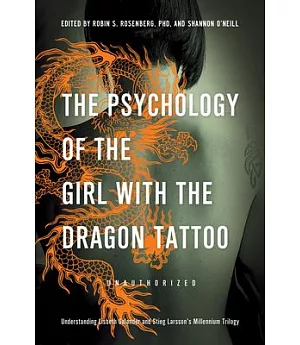Lisbeth Salander, the multi-faceted protagonist of Stieg Larsson’s Millennium Trilogy, is an enigma—an astoundingly intelligent, prickly bundle of contradictions. What makes her tick? What
makes her special? Is she bound for an inevitably self-destructive end? Or can she rise from the ashes of her childhood trauma?
Psychology of the Girl with the Dragon Tattoo investigates Lisbeth the same way Mikhail Blomkvist might, seeking answers from mental health clinicians and researchers to better
understand Salander, her psychology, and her world—including the ways in which that world reflects, or doesn’t reflect, our own.
What exactly is a psychopath—and is Lisbeth Salander one?
How do abused children cope with that trauma?
What impact would Lisbeth’s eidetic memory and Asberger’s Syndrome have on her development?
Do hackers share certain psychological traits?
Is there a psychology of sexism?
What makes Lisbeth such a polarizing figure—both in her world and ours?





















